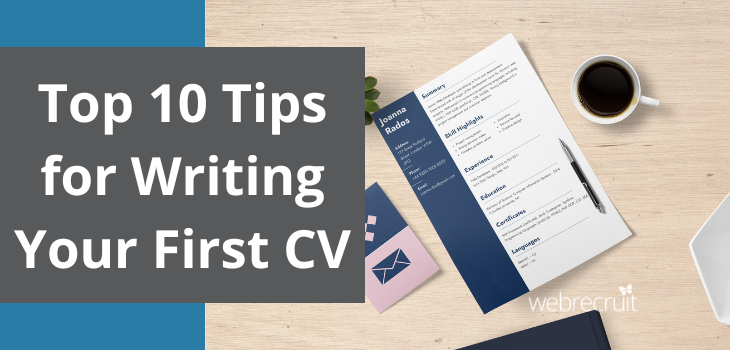Top 10 Tips For Writing Your First CV
Applying for your first ever job can be a daunting process but having the perfect CV ready to go can make it just that little bit easier. So, here are 10 essential tips to help you in writing your first CV and secure the job you want as you head out into the world!
1. Keep it short and to the point
Don’t worry if your CV isn’t pages and pages long. It’s better if it’s shorter! Employers won’t have hours to read through hundreds of pages of overly detailed CVs; they need to be able to scan them and determine if candidates have what they’re looking for. So, make sure you’re including the essential details without overcomplicating the language or length!
2. Font
When writing your first CV, your font should be professional, easy to read and used consistently throughout. Good examples of this are Times New Roman and Arial.
3. Contact details
To begin your CV, you’ll want to include your personal and contact details. These will act as your header and will consist of your name, phone number and email address. This way, employers know who you are from the off and how to contact you.
4. Experience
You may feel as though your CV won’t be brimming with experience but that’s okay. Time spent volunteering or babysitting, plus any work experience you’ve completed in or out of school can be included to showcase your skill set. Laying each point out, you’ll want to include the name of the company, your job title and your start and end date there, followed by a bullet pointed list of your responsibilities.
5. Education
When listing your education, for example, your GCSEs gained at secondary school, you can format these by writing your school’s name, the level of qualifications, e.g. GCSE, your start and end date there, the subjects you took and the grades you achieved.
6. Skills
You can simply list out your skills, covering everything from Microsoft Office and Google Suite to languages and communications skills. Going a step further, you can detail how you gained them, for example through extracurriculars or your interests and hobbies.
7. Awards
Any awards, honours or accolades you’ve received, in or out of school, can be a great addition to your CV. Just include the name of the award, where you achieved it and a quick summary of how you accomplished it!
8. References
Unless the job you’re applying for specifically says you need references when applying, you can state in your CV that they are available upon request. Typically, you’ll need two references and if you don’t have a previous employer, your teachers, family friends or careers councillors are great options. Just make sure you ask them first!
9. Proofreading
going through and proofreading your CV yourself is a great first step but having a teacher or relative read through it too can help to make sure you’ve included everything you wanted and there aren’t spelling mistakes you’ve missed!
10. Tailor it to the job you’re applying for
In each section, highlight the skills, experience, etc. you have that the job you’re applying for is asking for. This way, everything will be linked together to form a cohesive document telling the employer why you’re perfect for the job!





